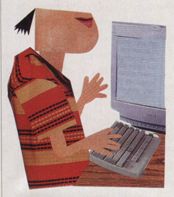| Electronic Hollywood / Jaime Levy Press From 1990 - 2000 | |||||
| Cartoons | Games | Websites | Ad Campaigns | Interfaces | Presskit |

|
I was going to trade shows and selling what I called an electronic magazine on a floppy disk. They would always give me a booth - oh, she's a girl and she's kind of cute and we'll let her sell her little disks for six dollars. And so one day this guy came up to me and he said, "You know, one day people are going to be getting this information over a network and, ka-chink, ka-chink, the money's going to go right into your savings account." This guy turned out to be my "angel" investor. He had become very wealthy from selling his company to Microsoft. He offered me a half-million dollars if I could put together a business plan for him in exchange for minimal ownership of the company.
It's not very bureaucratic here. I'm like the über person who sort of oversees everything and basically conceptualizes any new ideas for original content, the games and the cartoons. A lot of people who actually grind the stuff out are, like, the invisible staff; the freelancers. I can't afford their health plans for their little boy. You know? So I pay them a nice, decent hourly wage, and they can work at home in their underwear. We signed a contract for "CyberSlacker". It's a licensing deal for sixteen episodes on the Internet, each four to six minutes long. The idea is that people are going to come and look at this proprietary content and then buy merchandise related to it - like T-shirts, coffee mugs, and toy stuffed cats that fart - and we'll get a nice percentage of that. The goal is that the shows get popular, and people will want to see it on TV or in a movie. I'm in it to make my stuff and for people to see it and laugh. That's all. I make work on the Web right now, but I'm not loyal to the Web or anything. I don't really give a shit about the Web. I'm going to be rich. I don't have to worry about that. If I keep building the company and our revenues keep doubling and doubling - you know, the first year we made fifty grand, last year we made a half million, this year we'll make two million, the next year ten million, who knows... And then I'll sell the company, buy my house in the Hollywood Hills and buy my house in New York City and marry some Jewish schnook who will raise my children, and life will be great. That's all I really want you know.
- Interviewed by John Bowe
|
 So Electronic Hollywood became incorporated in October of 1997.
The first year it was like being thrown into a pool with all your
clothes on and not knowing how to swim. I ended up firing my own
brother. Everyone else either quit or turned against me. But then I
decided I'd just try to finish production on this Internet cartoon
I'd been working on called "CyberSlacker". It's an
animated cartoon about a hacker chick who moves to the East Village
in search of the American dream. And people think it is cool, I
guess. More gigs started rolling in. We went back to six people and
now we're up to ten. We have animators and programmers and producers
- it's a digital kibbutz.
So Electronic Hollywood became incorporated in October of 1997.
The first year it was like being thrown into a pool with all your
clothes on and not knowing how to swim. I ended up firing my own
brother. Everyone else either quit or turned against me. But then I
decided I'd just try to finish production on this Internet cartoon
I'd been working on called "CyberSlacker". It's an
animated cartoon about a hacker chick who moves to the East Village
in search of the American dream. And people think it is cool, I
guess. More gigs started rolling in. We went back to six people and
now we're up to ten. We have animators and programmers and producers
- it's a digital kibbutz.